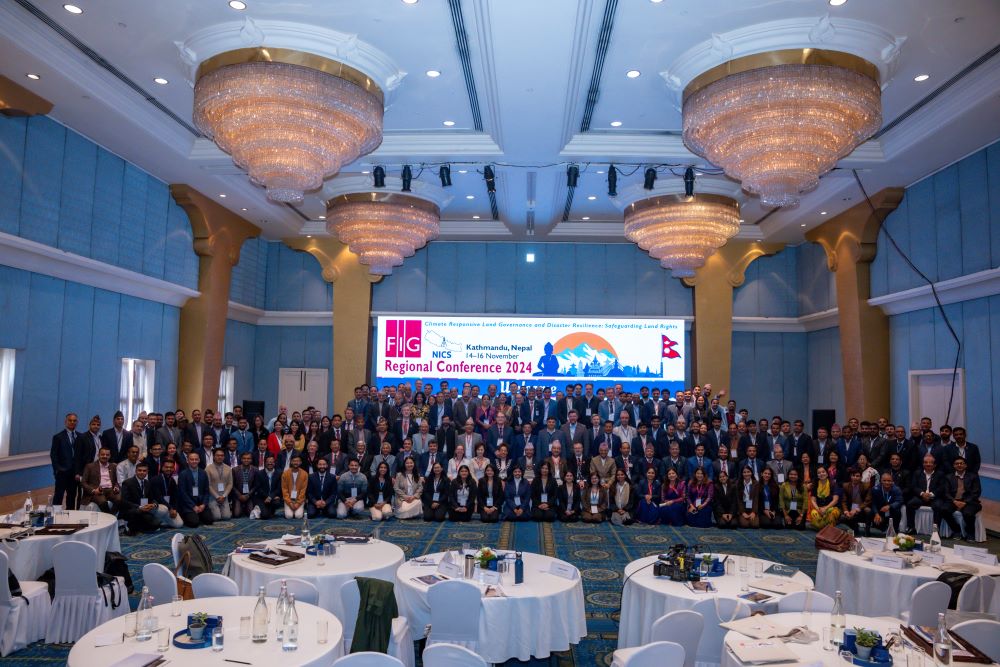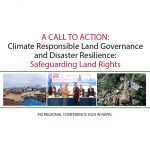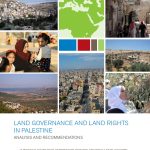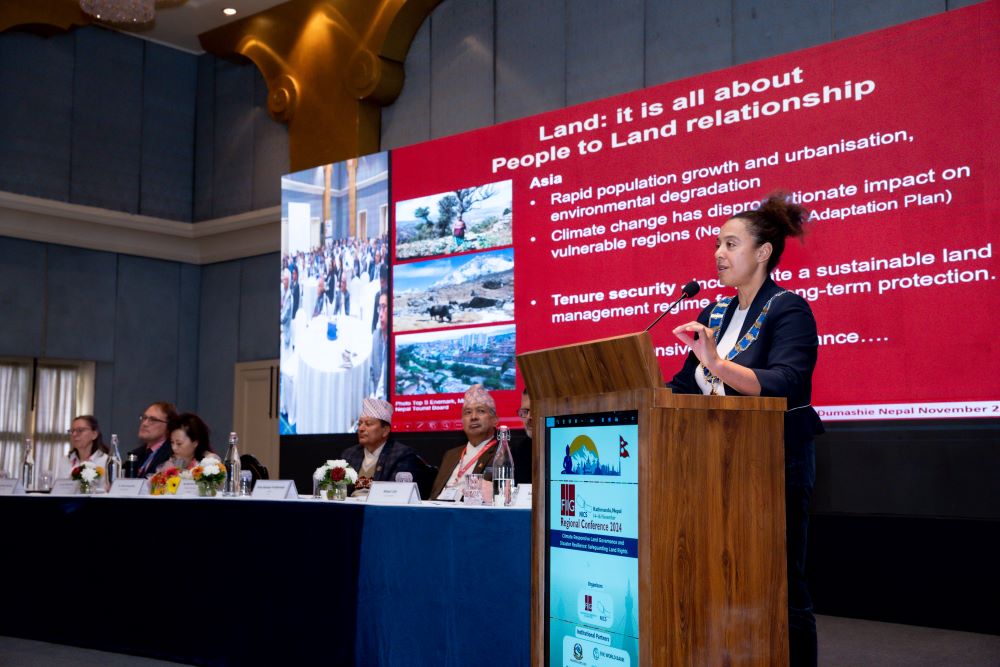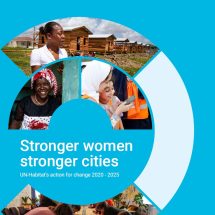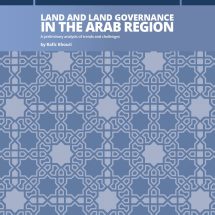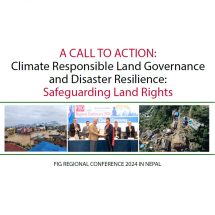Climate change remains a pressing global issue with far-reaching consequences that are profoundly impacting both life and land. At present, the global crisis lies at the intersection of climate change, food security, and poverty, challenges that have a clear dimension to the management of land and natural resources. Developing countries are particularly vulnerable to the adverse effects of climate change, which are presently disrupting agricultural production, reducing food security, depleting limited natural resources, and exacerbating existing socioeconomic disparities and inequalities among marginalized communities. It is within this context that the International Federation of Surveyors (FIG) in partnership with the Nepal Institution of Chartered Surveyors (NICS) and the Government of Nepal through the Ministry of Land Management, Cooperatives, and Poverty Alleviation (MOLMCPA) jointly co-organized a Regional Conference for Asia in Kathmandu from November 14-16, 2024. The event themed ‘Climate Responsive Land Governance and Disaster Resilience: Safeguarding Land Rights’, aimed at providing a unique opportunity to address the pressing challenge of safeguarding land rights amidst the impacts of climate change and disasters in the Asian region. Other partners included the UN-Habitat country office Nepal, GLTN, World Bank, Kadaster International as well as many other national partners from Nepal.
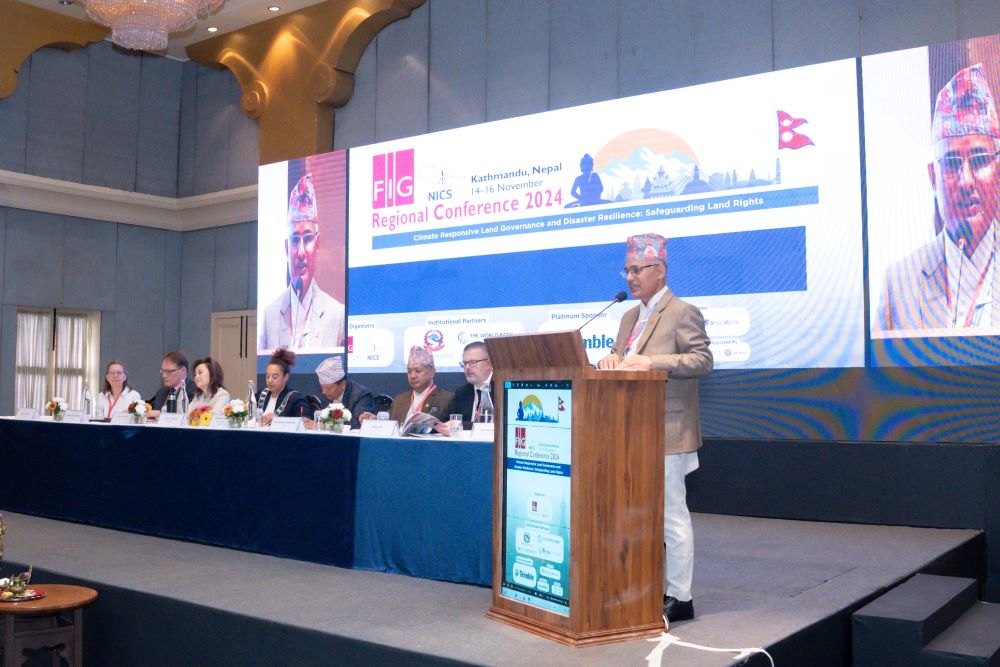
The main objective of the event was to build knowledge and capacity in the Asian region to address climate change and disaster-induced challenges in safeguarding land rights of vulnerable communities, emphasizing the critical role of land governance and disaster resilience. The second objective was to foster collaborative partnerships among national and regional institutions, academics, and professionals from various organisations, including non-state actors, Non-Government Organisation (NGOs) and private sector, to facilitate multistakeholder dialogues, knowledge sharing and technology transfer at the regional level.
Prior to the Conference, GLTN participated in a pre-event, ‘Multi-stakeholder Workshop on Land Use Planning in Nepal: Opportunities, Challenges and Prospects‘, organized by the World Bank in collaboration with the Ministry of Land Management, Cooperatives, and Poverty Alleviation (MOLMCPA) and the FIG, on November 13, 2024. This learning event aimed to facilitate knowledge exchange and policy dialogues in land use planning among diverse stakeholders highlighting international trends, good practices, diverse lessons and innovations in land use planning to support the Government of Nepal’s ongoing land use planning reform. The event showcased experiences and lessons learned from diverse land use planning pilots in Nepal as implemented by different partners (working with the MOLMCPA) including the World Bank, USAID, UN-Habitat and the Community Self Reliance Centre (CSRC), and lessons from other countries in the region including South Korea, as well as an assessment and recommendations to enhance Nepal’s Land Use Planning System. Yet another parallel event took place on this day, -the 5th FIG Young Surveyors Network Asia and the Pacific meeting- organized at the Land Management and Training Centre in Dhulikhel under the theme ‘Empowered Youth for Climate Resilient Land’. Throughout the various sessions, the critical role of young surveyors in shaping a sustainable future where land rights are recognized as fundamental to building disaster-resilient communities was emphasized, to contribute effectively to the climate threats in our world today.
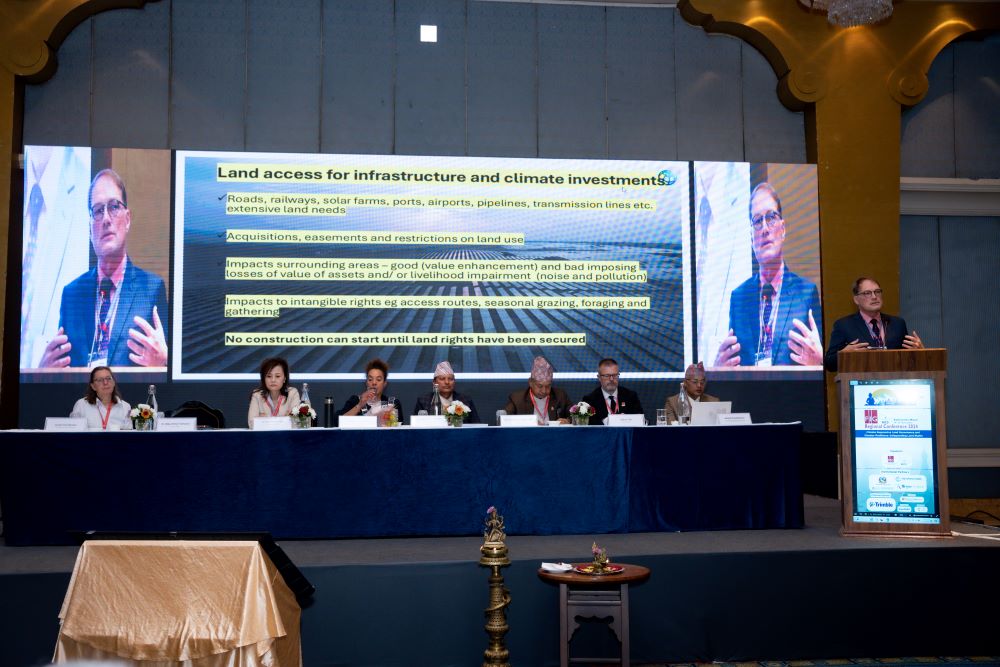
During the FIG regional conference GLTN actively engaged in plenary sessions, technical paper presentations, joint discussions/round table sessions, and strategic bilateral talks. On the first day, welcoming remarks were delivered by Mr. Ganesh Prasad Bhatta, the Joint Secretary and Spokesperson at the Ministry of Land Management, Cooperatives and Poverty Alleviation, Government of Nepal who underscored the pressing threat of climate change (especially in Nepal) and why it is crucial to address the issue of land tenure insecurity and its linkage with climate vulnerability. This was followed by keynote speeches, the first delivered by Dr. Diane Dumashie, the President of the FIG on the imperative for land professionals to act, as crucial actors in the domain of land administration and governance in addressing the pressing challenges of climate change. Dr. Mika-Petteri Torhonen, the Global Lead on land of the World Bank delivered the second key note speech on the growing demand for land in the South Asia region driven by climate change impacts on land suitability and the need to rethink ways of improving land access in urban development, affordable housing, public land management, transit oriented development, and for infrastructure investments, while emphasizing the importance of a sound land administration system to provide accurate information on titles and land rights for the lands needed for these projects.
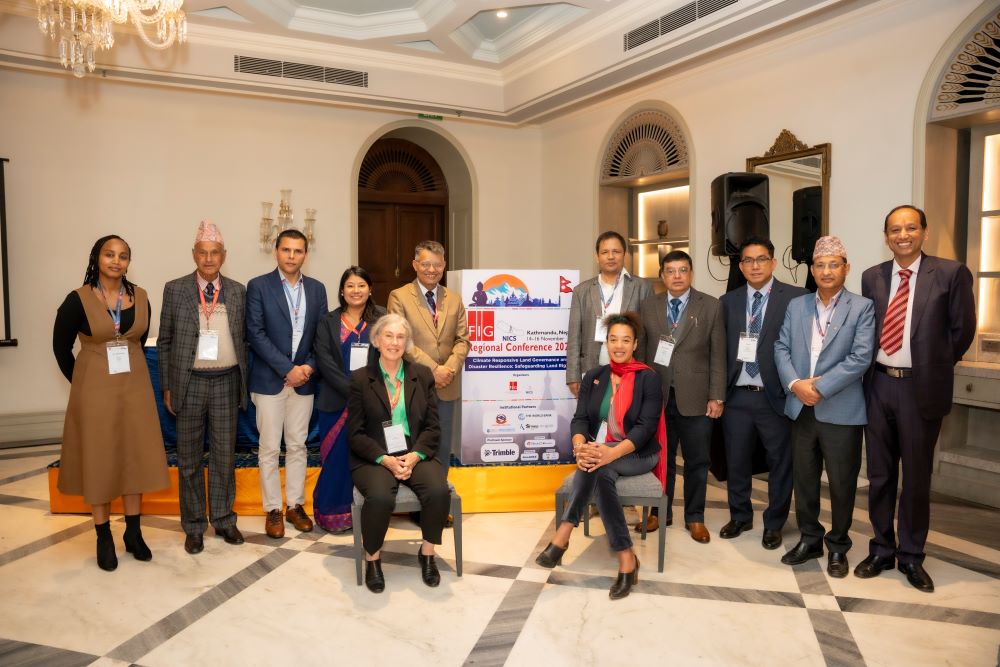
During the conference, GLTN innovative land tools and approaches were prominently featured in different technical paper presentations. On the first day, a paper presentation on the ‘global land valuation practices’ was made by Mr. Raja Ram Chhatkuli from the UN-Habitat country office exploring lessons for Nepal and how GLTN land tools can be integrated in this endevour. Using experiences from Nepal country projects, and in collaboration with our Partner in Nepal, CSRC, another technical paper was presented on ‘balancing access to land for the landless and protection of government and public land, towards sustainable land management in Nepal’ on the second day of the conference. Further, a paper jointly authored by the government of Nepal, Kadaster International, UN-Habitat and GLTN on effective land administration in the Asia-Pacific region was presented by Mr. Janak Raj Joshi, the Joint Secretary at the Ministry of Land Management Cooperatives and Poverty Alleviation, Nepal. The paper explored the ‘governance, legal, and financial pathways (some among the prescribed pathways in the Framework for Effective Land Administration (FELA) adopted by the UN-GGIM) within the climate change-land nexus’ towards effective land governance in the Asia-Pacific region. GLTN also chaired a session on ‘effective property valuation and taxation, lessons, analytics and new horizons’ aimed at highlighting experiences on how land and property valuation can increase revenue generation and improve urban infrastructure and municipal services. Further, GLTN participated in a roundtable as a panel member discussing property valuation and taxation in a session that delved deeper into three previous sessions on (i) how market transparency can mitigate the effects of climate risks on property values, (ii) how to establish a regional community of practice focused on land and property valuation in an effort to tackle the challenges of weak land administration systems, and (iii) how effective land and property valuation can increase revenue for municipal services.
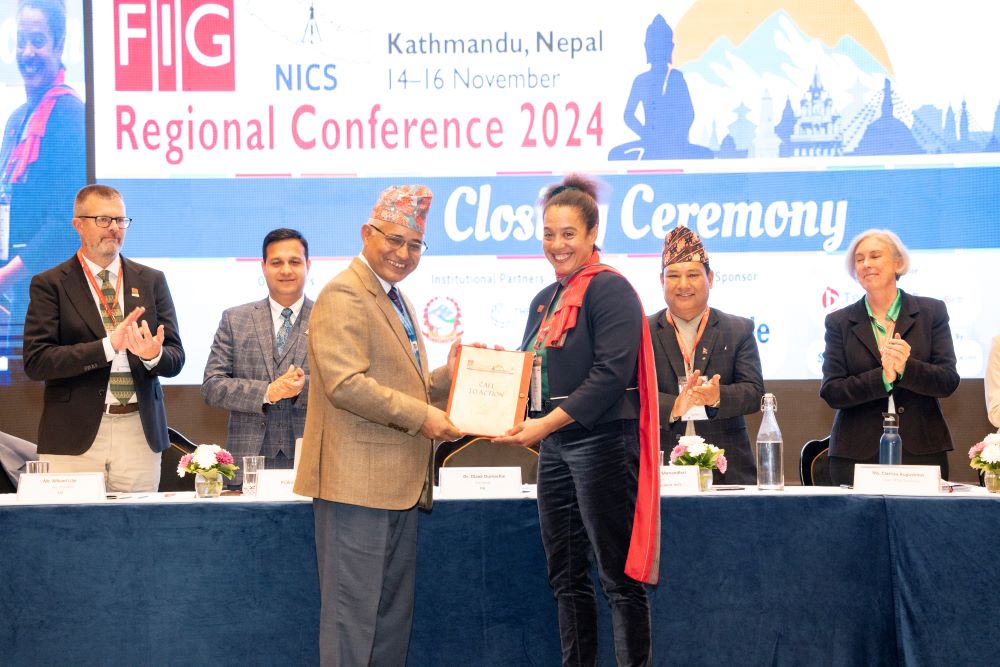
A major highlight of the conference was the finalization, presentation and handover of the ‘Call to Action on Climate Change’ to the Government of Nepal on the 15th of November 2024. The Call to Action examines and actively promotes the engagement and role that can be played by surveyors, property managers, land practitioners and all relevant parties in contributing to the climate change agenda and the achievement of Sustainable Development Goals (SDGs). The document underlines the various functions of the FIG community in articulating and using their expertise and practical knowledge to tackle the challenges in climate action, including focusing on the economic impact on the tenure (including ownership) and value of undeveloped and developed land. The ‘Call-to-Action’ calls on all FIG Member organizations, affiliates and surveying professionals, particularly in the Asian Region, to become involved in climate responsible land governance and disaster resilience, including safeguarding land rights as per the Call-to-Action resolutions. The full document can be sourced here.
In conclusion, the 2024 FIG regional conference in Nepal was a great success, bringing together over 300 participants from 35 countries, including surveying professionals from the Asian Region and beyond, land practitioners working in various sectors such as in the government (policy makers), the academia, civil society, intergovernmental organizations and the private sector. Aside from the plenary gatherings where various presentation focusing on climate change and disaster management in the Asian region were made, over seventy (70) papers were presented in well attended, vibrant sessions to enhance knowledge in land governance and how to effectively contribute to the mitigation of climate change. The GLTN acknowledges the reality of a changing climate, and its impact on life and land, and the disproportionate burdens this is having on vulnerable and marginalized communities. GLTN will continue working with the FIG and other GLTN Partners to increase efforts towards enhanced sustainable land use practices through improved land tenure security, to restore the productive capacity of land, to enhance ecosystem services, and support the livelihoods of local communities.
